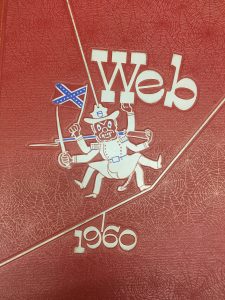
This image is a snapshot of the cover of the 1960 edition of The Web, the University of Richmond’s former yearbook. The cover features Confederate Spidey, who at the time was described as the University’s unofficial mascot. Dressed as a Confederate soldier and armed with a sword and a musket, the illustrated spider is also carrying a Confederate flag on the cover. Although Confederate Spidey makes thirty appearances in the yearbook there is no explanation of why the image is used so frequently in the two-hundred-page publication. The foreword simply reads, “may these pages hold many happy memories for you.”
It is possible that the copious use of the image in the 1960 edition was a nod to the impending centennial Civil War celebrations in Richmond. However such a gesture would have been more fitting to include in the 1961 edition of The Web during the actual centennial. So let’s consider for a moment that the imagery in the yearbook has little to do with the celebrations. The student editors, Richard Brewer and Betty Pritchett, had to have assumed that Confederate Spidey’s image could stand devoid of context in a university publication. Yet that assumption calls into question the extent to which Confederate Spidey was in fact an unofficial mascot of the University. If the students in charge of publishing a piece that represented the University to its student body saw no point in explaining the image’s use and used the image so frequently then it seems that the image was only unofficial in name but not in deed.
For a University of Richmond student in 1960 to be able to pick up a copy of the yearbook, simply shrug at the cover, and flip through its pages without considering the implications of Confederate Spidey means a few things. It means that the University was a place where such imagery was common. It means that the University was a place where students welcomed the idea of being represented by a mascot dressed as a Confederate. It means that voices in the campus community that may have been opposed to the imagery were not in the majority. It means that eleven years later when students asked the University Band to restrain its use of the song Dixie there was backlash.
Whenever Confederate Spidey is mentioned in the archive it’s noted that its use was unofficial. It seems that the word unofficial is used to absolve the University’s compliance in its use of racist imagery. Simply because Confederate Spidey was not inscribed on the University mace does not mean that the image did not come to represent the university as a whole. Confederate Spidey mattered to campus culture and touting its “unofficial’ use does not wash away the stain of racism from the University’s cloak.

